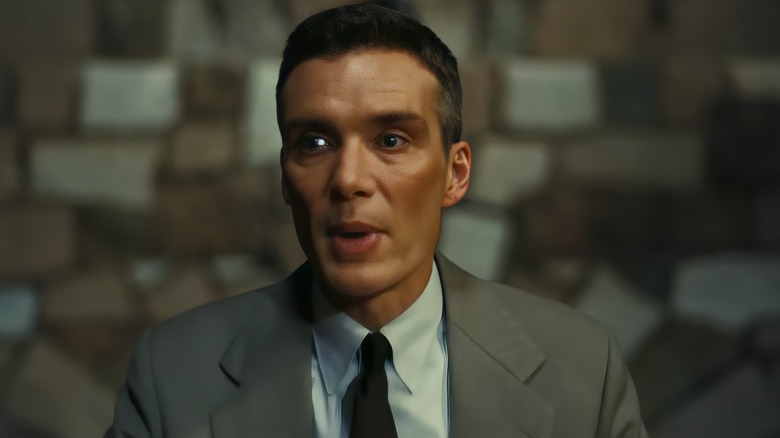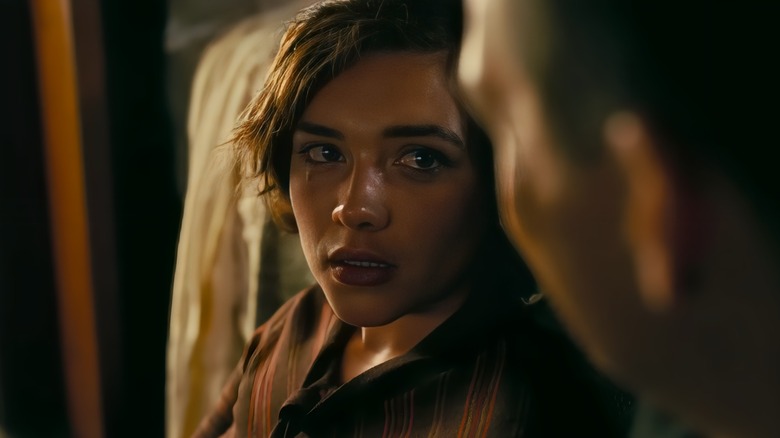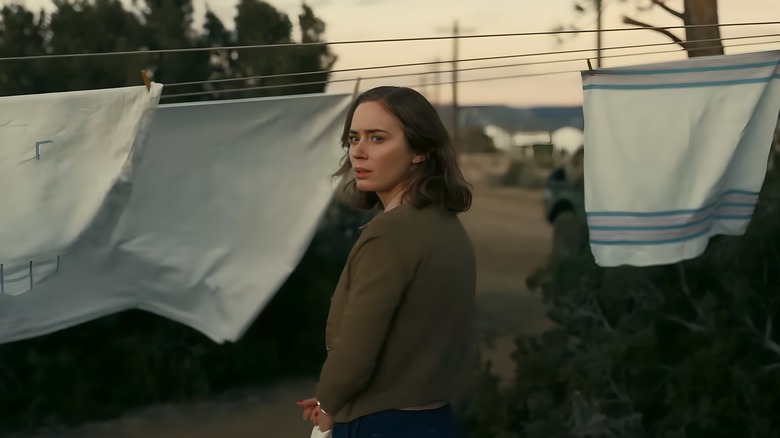The Unexpected Oppenheimer Moment That Really Caught Viewers Off Guard
Contains spoilers for "Oppenheimer"
When Christopher Nolan announced that he'd be tackling the controversial topic of America's most horrifying scientific advancement, we're pretty sure no one expected it was going to involve so much nudity.
Those heading to the theater this weekend to see the historical epic "Oppenheimer" should be prepared to see a lot of actors Cillian Murphy and Florence Pugh — especially if they plan on seeing it on a massive IMAX screen as Nolan suggests. The film sees Nolan directing his first sex scenes and, based on our count, there are at least three, all of them involving Murphy and Pugh's real-life characters. Though they are handled in arguably tasteful ways, one seems to stand out to audiences for how squeamish it makes them.
A bizarrely nightmarish moment sees J. Robert Oppenheimer (Murphy) and his on-again-off-again lover Jean Tatlock (Pugh) engaged in an extended, fully nude sex scene in the middle of the former's fateful AEC Security Hearing. The sequence, which occurs around halfway through the film's runtime, will likely surprise many audience members and has even elicited scattered, perhaps uncomfortable laughter at preview screenings. When you understand how the graphic scene is presented, however, it's not hard to imagine why.
The security hearing sex scene is appropriately jarring
During one of the film's many flashes to J. Robert Oppenheimer's security hearing, a clever camera movement sees the physicist go from fully dressed to butt-naked in the middle of a government building. Of course, meant to be metaphorical, Oppenheimer's starkness receives little contextual build-up or warning, surprising audiences in a way not dissimilar to a jump scare. Another cut brings Jean Tatlock into the scene with almost as much surprise, mounting Oppenheimer and staring pointedly into the eyes of his horrified, on-looking wife Kitty (Emily Blunt).
The fact that Murphy maintains his calm, detached demeanor throughout the scene and continues to deliver cold testimony with someone writhing on top of him only drives home how uncomfortable (and, apparently in certain cases, funny) the scene is for some. In the defense of those audience members who catch the giggles during what will surely go down as one of cinema's strangest sex scenes, the presentation is admittedly — and intentionally — shocking. That's the whole point.
Nolan has perfectly translated Kitty's horrific experience
"Oppenheimer" has been described by Christopher Nolan as a horror movie. While it certainly lives up to the genre in its existential exploration of nuclear power, this tone also extends to its most intimate moments.
It wasn't too long ago that The Weeknd was attempting to defend some similarly uncomfortable sex scenes in HBO's "The Idol" by saying they were supposed to be troubling. Though this explanation rang false for the clumsily exploitative series, a comparable justification could fit this moment in "Oppenheimer." The horror of the sex scene in the security hearing is not the act itself, but that it's being painted in the mind of the woman Oppenheimer cheated on.
From the way the scene is framed (and especially with Jean Tatlock's eye contact), it's pretty obviously being shown from Kitty's subjective perspective. J. Robert Oppenheimer's approach of laying himself bare to the committee may be good for his case, but it's absolutely devastating to Kitty in a way that's perfectly captured by her — and a room full of strangers — watching the man she trusted having sex with someone else. It's a precise visual translation of a unique, abstract feeling she's tormented by at that moment, a total theft of privacy, autonomy, and dignity.
If the sex scenes in "Oppenheimer" made you uncomfortable, perhaps so much that you let loose a giggle or two, that's absolutely fine. But it may be worth examining if it was actually the nudity or sex that caused the uneasiness, or what those scenes said about the complicated man at the center of it all.


